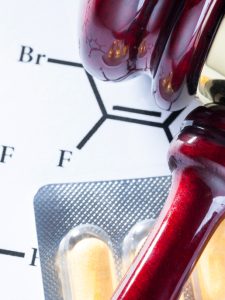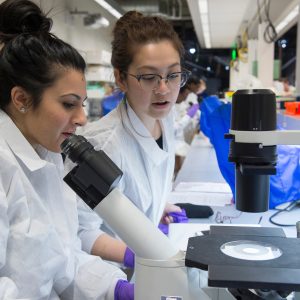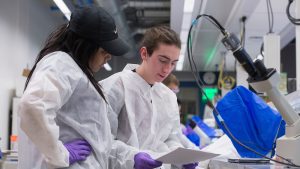Applications Now Open
MS in Regulatory Science
MS in Regulatory Science Program Overview
A life-changing medical device. A time-saving, on-the-go meal. A revolutionary remedy.
We live in a day of innovation – but a lot happens between idea and execution. Regulations exist at nearly every stage in R&D, from clinical trials to marketing. With advancing technology, developing consumer standards, and evolving legislation and policies, leaders with expertise in regulatory affairs have perhaps never been more important to a company or organization’s success.
Whether your goal is to help companies bring compliant products to market or to ensure consumer safety through work with a government agency, you will find plenty of opportunities in the field of regulatory science.
A Closer Look: What is Regulatory Science?
The FDA defines regulatory science as “the science of developing new tools, standards, and approaches to assess the safety, efficacy, quality, and performance of all FDA-regulated products.”1 Just a few examples on this list would include:
- Medical devices
- Pharmaceuticals
- Veterinary products
- Diagnostics
- Cosmetics
- Food/beverage products
- Nutritionals/vitamins
Other regulatory agencies include the USDA (meats, poultry, and produce), the Environmental Protection Agency (water, pesticides), the Federal Trade Commission (advertising practices), and the Consumer Product Safety Commission.
When you consider the vast number of products regulated by the government, it’s clear why regulatory science professionals are in higher demand around the globe.
Study on Your Terms
This online program is designed to offer the flexibility working professionals need while maintaining work, life, and school balance.
In-Depth Article
What is Regulatory Science?
Ethics, public health, and medicine intersect with compliance, consumer safety, and public health in regulatory science. Learn about potential career paths and the value of this master’s degree.
Upcoming Events
Why to Pursue an MS in MS in Regulatory Science at Hopkins
Capitalize On Our D.C. Location
JHU’s location gives us access to top professionals—and a front-row seat to the latest developments in regulatory affairs. Whether you’re on campus or across the country, you’ll learn from faculty members at the forefront of their fields.
Choose Electives to Fit Career Goals
Focus on the business side with classes such as Funding New Ventures, Marketing in a Regulated Environment, or Promotion of Biomedical Products. Or dive into the sciences with courses like Regenerative Medicine, Nanobiotechnology, or DNA Sequencing.
Expand Your Professional Network
When you enroll at Johns Hopkins, you become part of an international community of regulatory affairs and R&D professionals who work in labs, agencies, and companies around the world.
Leverage Your Experience and Expertise
Your past experience will give you an edge in your new career. According to the Regulatory Affairs Professionals Society, 88% of regulatory affairs professionals began their careers in another field.
Biotechnology News
Take the Next Step
Gain the skills and knowledge you need to bring innovative products to market while protecting public health and safety.
Contact Us for More Information
Advanced Academic Programs Admissions
Sources
1 “Advancing Regulatory Science: Moving Regulatory Science into the 21st Century” Accessed online on December 3, 2021.









